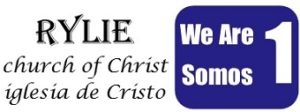Bulletin for 12-18-22
Birthdays and Anniversaries
None this week
Prayer requests:
Rachel Prater, Dena’s cousin, Rodney’s, recovering at home. Prayers please.
Chloe Birdwell, relative of the Weeks’s, great improvement, in a program in Houston. Keep praying, please!
Paul Tyler has a bad sort Parkinson’s. Got stem cell treatments. Pray for their success.
Bill Grubbs, is home now and doing better
Tonita, Paul’s friend, heart valve replacement needed
J R Medellin, Tiffany’s (Chance) husband, still doing well. Vanessea is doing well after her surgery.
Shirley Weeks, Steve’s mom, continues to have trouble.
Sarah, Chris Girvin’s sister, on hospice care
Robert and Sue Waller, health issues
Darla Nitti, Wendi’s mom, not doing well.
Leta, has a recurring cancer, prayer request from her granddaughter via our website.
Tammy Jones, Weeks’ neighbor, kidney failure/dialysis
Article:
God cares for his people
Joseph made his brethren promise not to bury his bones in Egypt. He told them God would visit them and they could carry his bones out of that land. Joseph died, his body was embalmed and placed in a coffin in Egypt (Genesis 50:22-26). Those bones suggest the story was not yet complete.
Moses began Exodus with a list of the sons of Jacob who entered Egypt with their father (Exodus 1:1-5). The population of the children of Israel grew to fill the land. A Pharaoh ascended to the throne who did not know Joseph. His fear of the rapidly multiplying Hebrews caused him to deal wisely, or craftily, with them by placing them in slavery. They built the supply cities of Pithom and Raamses. Pharaoh might have hoped hard work would decrease their numbers, but they grew (Exodus 1:6-14)!
The king approached the two women in charge of the Hebrew midwives and told them to kill all the boy babies at birth. Their fear of God caused them to refuse to be a part of such cruelty. The number of the people continued to grow, which they explained to Pharaoh as resulting from the Hebrew women being more sturdy than the Egyptian women. The children were born before midwives arrived on the scene. God blessed these women with homes and families (Exodus 1:15-21).
The failure of his first two plans caused Pharaoh to tell the Israelites to cast all male children into the river. Amram and Jochebed, of the tribe of Levi, had a son during this time. The beauty of this male child caused his parents to believe he was specially favored by God. They hid him for three months (1:22-2:2; Acts 7:19-20; Hebrews 11:23).
Jochebed placed her growing boy in a waterproofed ark of bulrushes in the reeds by the river bank with his sister set as a watch. Pharaoh’s daughter found the child during her morning bath. She adopted him and named him Moses, which means “drawn out,” because she had drawn him out of the water (Exodus 2:3-10). The child’s sister stepped up and asked if they would be needing a wet nurse, thus returning him to the care of his own mother. Moses thus came to know all about God and his people while being educated in all the Egyptians knew (Acts 7:21-22).
Moses “went out to his brethren” at the age of forty, apparently choosing to suffer with the people of God (Hebrews 11:24-26). He decided, without proper authority, to defend one of his brethren, who was being beaten, by killing the Egyptian. He looked both ways before killing him and buried the body in the sand. Stephen says Moses thought the people would recognize God had chosen him to deliver them from bondage. The fact that they did not is clear proof that they were “stiff-necked and uncircumcised in heart and ears!” The fathers resisted the directions of the Spirit (Acts 7:23-25, 51). The next day, he saw two Hebrew men fighting. When Moses tried to stop them, one of them made reference to the killing of the previous day. Moses fled to the land of Midian before Pharaoh could kill him (Exodus 3:11-15).
God’s hand can be seen throughout the beginning of Exodus. As surely as he did not forget his people in Egypt, he will not forget us. No wonder Peter says, “Therefore humble yourselves under the mighty hand of God, that He may exalt you in due time, casting all your care upon Him, for He cares for you” (1 Peter 5:6-7).
Gary Hampton, link to original article
